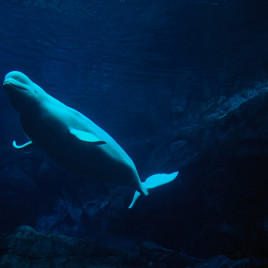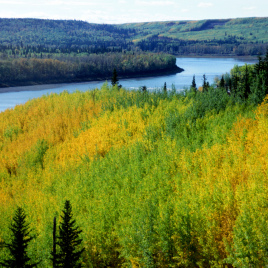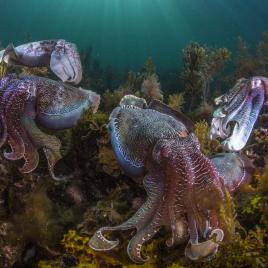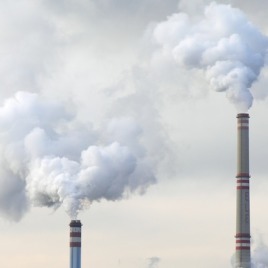There has never been a more urgent time to study climate change. Average Arctic temperatures have increased at nearly twice the global average in the past 100 years. The extent of Sea ice is also at its lowest levels since records were kept. As temperatures rise and sea ice retreats, Canada’s north is already experiencing […]
Tag: climate change

As sea-ice melts, beluga whale migration patterns change 
Every year in the summer, belugas swim to a predetermined spot to moult, feed and mate. But the melting and subsequent shifts in sea-ice could get in the way of the whales’ vital trek. A new study analyzes data from a 20-year span to study how shifting ice patterns influence beluga migration. Researchers found that […]
Bird droppings responsible for a small but much-needed dip in Arctic temperature 
Droppings from migratory seabirds are linked to cloud formation in the Arctic, offering a small cooling effect in the region. Clouds have offered a respite from rapid rise in Arctic temperatures, but previously there wasn’t much information available about the source of cloud growth. Using a combination of observations and computer modelling, a team of […]

Keeping track of forests with satellite images 
We can tell when deciduous trees’ photosynthesis cycles change, whether we’re aware of the phenomenon or not—we witness this every autumn, as the leaves change colour and fall off. But in evergreen trees, the colour change is much subtler and therefore harder to track. An international team of researchers found that sensor data from satellites […]

In changing oceans, cephalopods are booming
As climate change affects the ocean environment, many species are declining – but not the ocean’s cephalopods. Populations of these creatures, which include octopus, cuttlefish, and squid, have increased over the past 60 years. Researchers believe their characteristics, such as rapid growth and short life-spans, allow them to adapt to changing ocean conditions more quickly […]

Emissions to cause even more profound warming 
Burning all the Earth’s remaining fossil fuels could lead to an average temperature increase of about 8 °C across the globe—with an increase of 17 °C in the Arctic—by 2300, say researchers at the University of Victoria. Using a series of comprehensive Earth system models, researchers simulated long-term warming in response to releasing five trillion […]
How much warming has China caused?
As China has become increasingly industrialized over the past few decades its fossil fuel use has grown, along with its greenhouse gas emissions, and particulate air pollutants. Yet new research shows that its contribution to global warming has remained remarkably stable. Authors of this study show that China is responsible for about ten per cent […]
Changing grasslands in North America
The productivity of grasslands in North America will increase in future climate scenarios, despite higher temperatures and increased drought, say researchers. They developed this forecast using a new model of the region’s hydrology and vegetation, incorporating data and images gathered from a network of cameras. The model showed an earlier start to the growing […]
Cloudy skies are enhancing ice sheet melt
Cloudy night skies are enhancing the ice sheet melt in Greenland by more than 30 per cent each year, according to a new study. Researchers believe this shows the need for including accurate cloud representations in climate modelling. The research team examined the effects of different types of clouds, such as “ice-only” or “liquid-bearing”. They […]
Budgeting for climate change – A series from Nature
This week a group of articles were published in Nature Geoscience and Nature Climate change jointly focused on “budgeting for climate change”. In one article, researchers, argue against the two degree target limit for global temperature rise. Another paper suggests we should aim to aggressively reduce our current emissions, as soon as possible, saying this […]
The backwards effects of warming
Manipulating the food-web to reduce carbon-dioxide emissions may have the opposite effect under a warmer climate, according to a new study. Under certain conditions increasing water temperatures can cause what are called ‘trophic cascades’ – These occur when a population increase or decrease in a one species impacts other species in the food-chain, by making […]
The perfect temperature for productivity
Rising temperatures from climate change will slow economic productivity, and if left unchecked will lower the average global wage by 25 per cent by 2100, according to a new study. Economic productivity peaks at 13 ºC, and declines at lower or higher temperatures, according to a review of global economic data from the World Bank. […]
Using the benefits of climate change to convince non-believers
Motivating people to take action on climate change, regardless of their existing beliefs, can be done by communicating the social benefits of acting in a climate-friendly way, according to researchers. Communicating development benefits (such as economic and scientific advancement) and the benevolence benefits (such as a more moral and caring community) helped to motivate people […]
Top predators protecting trapped ocean carbon
Over-harvesting top level predators from the oceans and coastal habitats could have far-reaching consequences on the carbon cycle and diminish our ability to offset climate change. Coastal vegetation, such as seagrasses and mangroves, are more efficient at capturing and storing carbon than tropical rainforests, and account for more than half of the ocean’s carbon storage […]
Who owes what? Quantifying global climate debt
A letter in Nature Climate Change presents a new way to quantify the contribution each country has made to climate change through a nation’s carbon and climate debts. This new method ranks Canada as the fourth largest climate debt-holder. Considering only national CO2 emissions from fossil fuel combustion accumulated between 1990 and 2010 the […]
Global tree count: Seeing the forest through the trees
There are approximately three trillion trees in the world, according to density estimates of every continent except Antarctica, a number much larger than previous estimates of just over 400 billion trees. However their research also estimates that humans have cut down 46 per cent of the world’s trees since the beginning of human civilization. The […]

